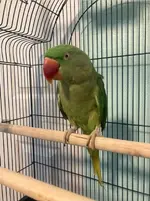Alexandrines are lovely! Aside from that spectacular green, they're *extremely* intelligent and learn very, very quickly. If you put the time in to training your bird, she'll relish the challenges you give her and respond willingly.
One thing I know about all ring-neck species (including plum-heads, derbyans, moustaches etc) is that they can often be 'touch me not' birds. I've had mine since they were just babies, but they've never ever been comfortable with being petted or stroked or, indeed, touched in any way. Despite that, they just *love* me and never want to be separated from me, hanging out on my shoulder or wrist or on top of my head or swinging from my plait.
On the other hand, we certainly have some members whose Alexes love scritches and cuddles, so it just depends on your birdie and what her needs are. If she turns out not to enjoy being touched, just go with the flow and find out how she likes to express affection for you.
Some people are put off by that huge red bill, but honestly, no bird should ever have reason to bite a person and yours won't if you watch her carefully and take notice of the signals she gives you. Alexes use eye-pinning a *lot* and if you ask for something (eg. 'step up') and birdie flattens her feathers and pins her eyes at you (shrinks the pupils down to a pinpoint), then step away and try later. Having said that, though, the big red bill can pack a lot of force, so just be mindful of it without letting it frighten you.
Alexes are birds of the treetops, so they really adore flying. If you can give yours some opportunities to fly from room to room in your house, she'll benefit greatly from the exercise and be lots healthier because of it. This gives you the chance to do recall training too. It can be very useful indeed to have a bird that comes when it's called, especially if birdie ever gets out! Another useful thing is to teach her to fly *down* to you from a height. Many birds never learn this skill and it might matter one day if she ever did get out. My Barney got out a few years ago and sat in a tree looking desperately at me: he was unable to fly down and so instead he flew right away and was lost for over a month.
Anyway, I hope you enjoy your new Alex. Do post more photos, once she's home and settled in (might take weeks, but that's OK. There's plenty of time.)


